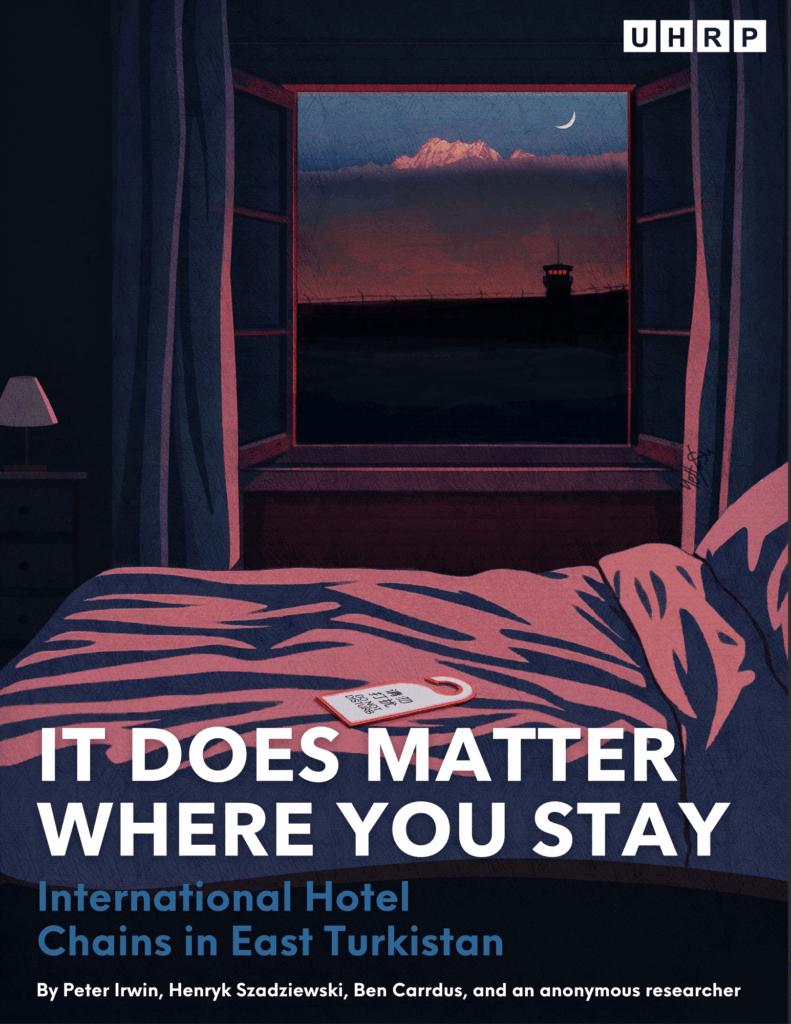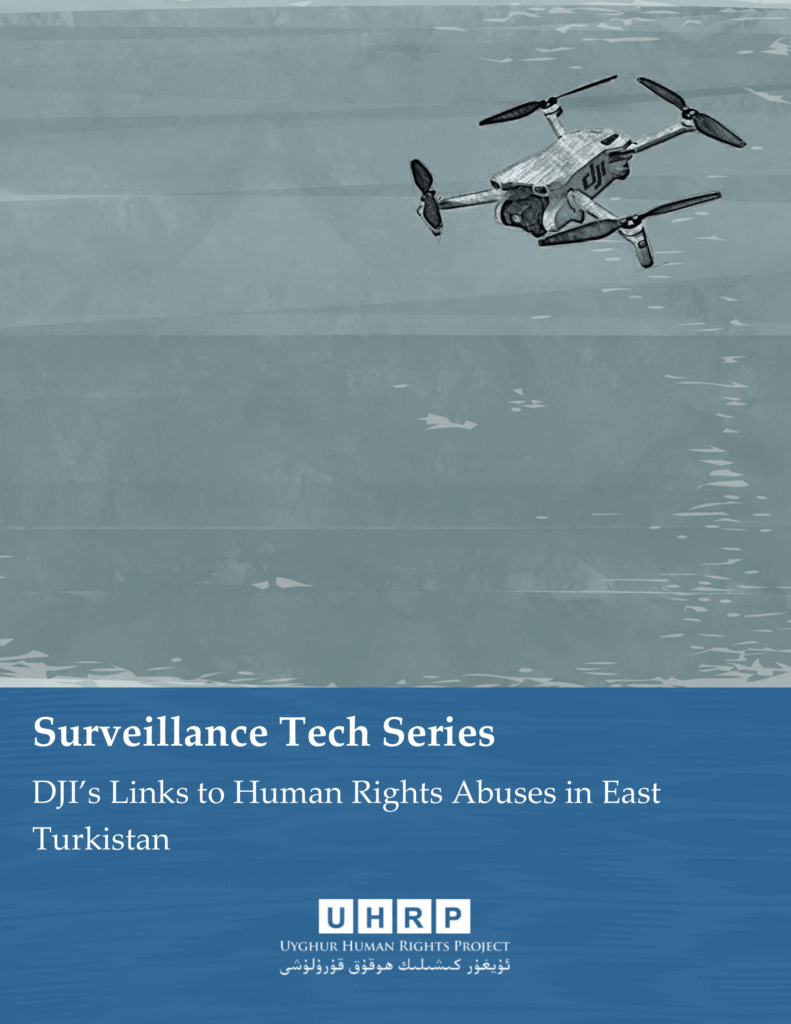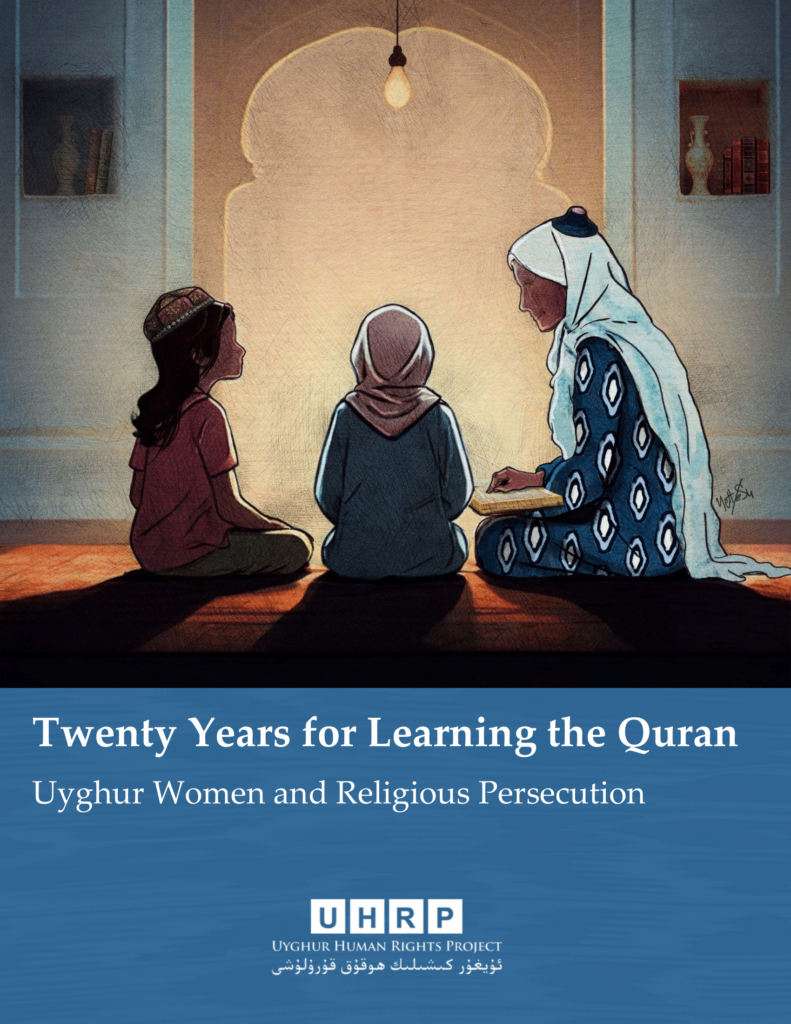A Uyghur Human Rights Project briefing by Henryk Szadziewski, the second in a series focusing on tourism complicity in East Turkistan. Read the first briefing, Genocide Tours: International Travel Companies in East Turkistan, read our press statement on the briefing, and download the full briefing in English.
Last updated March 12, 2024

I. Key Takeaways
- Eighteen European travel companies from France, Germany, Italy, Spain, Switzerland, and the Netherlands currently offer tours to East Turkistan despite an ongoing genocide and crimes against humanity.
- In addition to the 18 European travel companies, an August 2023 Uyghur Human Rights Project (UHRP) briefing documented five travel companies based in Australia, North America, and the UK that also currently advertise tours to the region.
- UHRP calls on international travel companies in Europe, as well as North America and Australia, to cease profiteering from genocide.
- UHRP does not advocate for a ban on travel to East Turkistan, leaving the decision to visit the region to the conscience of the individual traveler, but calls on travel companies to cease organized tours.
- European travel companies should not only join national trade associations that are full members of the umbrella European Travel Agents and Tour Operators’ Association (ECTAA), but also adopt the Roundtable Human Rights in Tourism’s human rights standards for conducting business.1In the original text, the ECTAA, and not the Roundtable Human Rights in Tourism were credited with formulating the human rights standards for conducting business, also known as the Implementation Guidelines.
- UHRP recommends European travel companies, national associations, and the ECTAA include the Framework Convention on Tourism Ethics approved by the UN General Assembly in 2019 as further benchmarks for business standards.

II. Profiteering from Genocide
In August 2023, the Uyghur Human Rights Project (UHRP) published Genocide Tours: International Travel Companies in East Turkistan, a briefing shedding light on international travel companies that advertise tours to East Turkistan in English. These companies are primarily based in the United States, Canada, the United Kingdom, Australia, and New Zealand. UHRP now examines tours offered by companies based across Europe and in languages other than English.
These travel companies are not only facilitating visits to these destinations, but also perpetuating Chinese government narratives that present Uyghurs as an “exotic” people for tourist consumption.
To identify these companies, UHRP employed a straightforward methodology. We conducted searches in French, German, Italian, Spanish, and Dutch using the terms “Uyghur,” “Xinjiang,” “Kashgar,” “Urumqi,” and “Silk Road” in combination with the word “tour” on Google’s main search engine. This search revealed 18 companies in six European countries offering 25 tours to East Turkistan. While this survey may not encompass the entirety of the tours available in these countries, it does demonstrate the accessibility of such tours, suggesting that the 18 identified companies might only be the tip of the iceberg.
Just as in our August 2023 briefing, UHRP is urging these 18 companies to discontinue tours to East Turkistan. Since the previous publication, two companies, Goway Travel and Intrepid Travel, have ceased offering visits to the region. However, five companies, namely Abercrombie & Kent, Bamboo Travel, Geographic Expeditions, Laurus Travel, and Wild Frontiers, still advertise tours to the Uyghur region.
UHRP maintains its concerns regarding organized travel to East Turkistan. These tours take tourists to Kashgar, Turpan, and Ürümchi, all of these destinations are linked to genocide and crimes against humanity. These connections arise from the repression of religious beliefs, the destruction of cultural heritage, racial profiling, surveillance, internment, and imprisonment of Uyghurs and other Turkic peoples. All 18 European travel companies visit at least one of these three locations.
Numerous travel companies, including China Roads (France), Intermèdes (France), Asien Special Tours (Germany), China Tours (Germany), Papaya Viaggi (Italy), Shiraz Travel Tours (Italy), Vitagi (Italy), Pangea Travel (the Netherlands), and Riksja Travel (the Netherlands), feature the Karez in their travel itineraries. The Karez comprises a network of underground channels established in the 15th century, designed to transport water from the Tengritagh, or Heavenly Mountains, to the Turpan Basin using gravitational force. These channels play a vital ecological role in sustaining the habitats of native flora and fauna, as well as supplying water for household needs and agricultural irrigation.
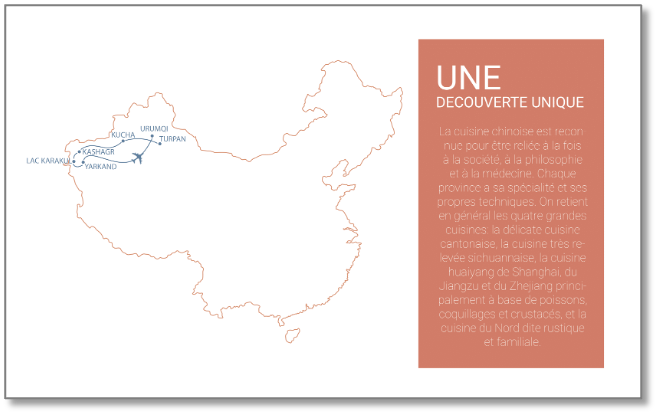
As highlighted in the UHRP report titled The Complicity of Heritage: Cultural Heritage and Genocide in the Uyghur Region, there has been a historical revisionism regarding the origins of the Karez. This revision has shifted the recognition of this engineering feat, which originated from Uyghur knowledge and effort, into the narrative of Chinese history. The authors of the UHRP report, Professor Rachel Harris and Aziz Isa Elkun, write, “As acknowledged by the International Criminal Court, acts of dispossession and destruction of cultural heritage are often the precursor to acts of genocide…They are a form of cultural warfare aimed at the elimination of a people and their identity.”
These travel companies are not only facilitating visits to these destinations, but also perpetuating Chinese government narratives that present Uyghurs as an “exotic” people for tourist consumption. Examples of these narratives can be found in the promotional materials of companies such as Asien Special Tours (Germany), Papaya Viaggi (Italy), Shiraz Travel Tours (Italy), Rutas10 (Spain), and Intermèdes (France). Riksja Travel (the Netherlands) goes as far as describing the rebuilding of Kashgar Old City, despite its demolition and the subsequent dispossession of thousands of Uyghurs, as having been done “tastefully.”
Many of these tours offer intrusive and problematic “experiences” for visitors, such as visits to Uyghur homes, which families are in no position to refuse given the environment of securitization and state control. This represents a significant violation of privacy and perpetuates the surveillance programs that have been carried out in Uyghur homes. As an example, the French travel company Hasamélis, as part of its La Route de la Soie Chinoise tour, offers dinner in Turpan with a Uyghur family in their home. Other companies offering home visits include EMS Voyage, Shiraz Travel Tours, and Viatgi.
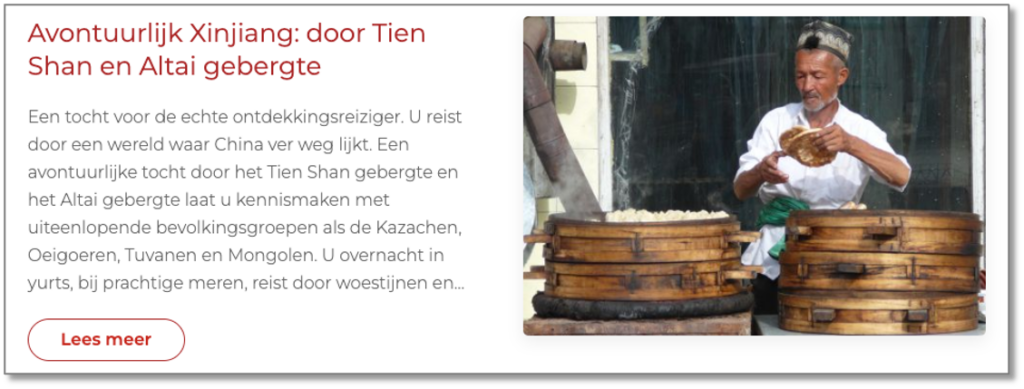
By bringing tourists to East Turkistan, these travel companies are implicitly supporting the normalization of genocidal Chinese government policies aimed at eradicating the Uyghur identity, further denying the Uyghur people the ability to define “Uyghurness” for themselves.
UHRP is clear in its message: we are urging international travel companies in North America, Europe, and Australia to cease profiteering from genocide. We do not advocate for a ban on travel to East Turkistan, leaving the decision to visit the region to the conscience of the individual traveler.
We recommend travel companies and trade associations call for an end to tours to East Turkistan and to increase due diligence processes and human rights compliance in line with international standards. Travel companies have the opportunity to turn from selling “Genocide Tours” to becoming Uyghur allies through publicly canceling tours and condemning China’s crimes against humanity.
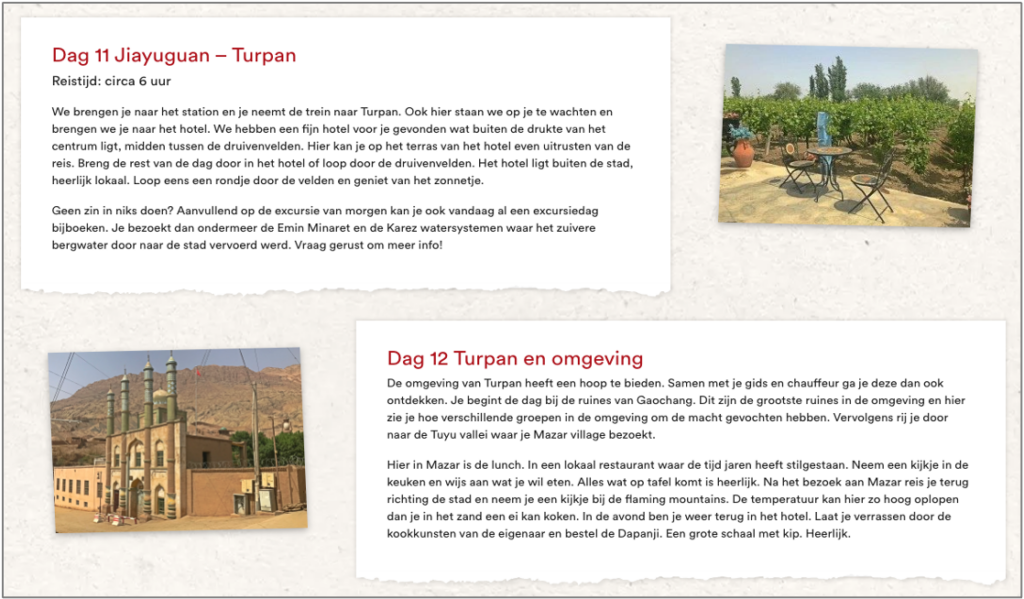
The table below shows the findings from our search of European travel companies currently offering tours to the Uyghur region.

III. European Standards
The European Travel Agents and Tour Operators’ Association (ECTAA), based in Brussels, is a continent-wide entity overseeing national trade organizations in Europe. Les Entreprises du Voyage (France), DRV (Deutscher Reiseverband) (Germany), Confturismo-Confcommercio and FTO (Federazione Turismo Organizzato) (Italy), ACAVe – Asociacion Corporativa de Agencias de Viajes Especializadas (Spain), SRV (Swiss Travel Association) (Switzerland), and ANVR (Algemeen Nederlands Vereniging van Reisondernemingen) (the Netherlands) are all full members of the ECTAA. For example, through their membership of Les Entreprises du Voyage, French travel companies EMS Voyage and Hasamélis are linked to the ECTAA.
The ECTAA has committed to human rights best practices “according to the UN Guiding Principles on Business and Human Rights through preventing, addressing and remedying human rights abuses committed along the supply chain in their business operations.” The ECTAA has posted Implementation Guidelines developed by the Roundtable Human Rights in Tourism, a Europe based membership organization comprised of industry stakeholders. The Implementation Guidelines aim to mainstream human rights into the work of European travel companies and includes the following documents:2In the original text, the ECTAA, and not the Roundtable Human Rights in Tourism were credited with formulating the human rights standards for conducting business, also known as the Implementation Guidelines.
- Responsible Tourism in Oppressive Regimes – A Guide for Tour Operators to Put People First
- Human Rights in Tourism – An Implementation Guideline for Tour Operators
- Tourism in Fragile Contexts – Guidelines for Product and Communication Managers for the Implementation of Human Rights-Related Due Diligence
In the document Responsible Tourism in Oppressive Regimes, the Roundtable Human Rights in Tourism recommend guidelines relevant to the Uyghur context, which are quoted below:
Local Value Creation
The local population should benefit from tourism. In oppressive regimes, however, there are often upstream mechanisms (e.g., state agencies, visa fees and similar). This requires an analysis of value creation and how it can be distributed to have a direct positive impact on the local population.
Employment
The local population should be involved as broadly as possible in business processes, employment and decisions that affect the destination. Oppressive regimes tend to violate labour rights, promote forced labour or slavery, or structurally discriminate against certain marginalised groups (such as women, migrant workers, ethnic minorities or LGBTQI+ groups). This requires heightened due diligence in recruitment criteria, wage structures, employee welfare and safety measures.
Empowerment of Travellers
Travellers can have an impact by visiting a country with a politically challenging context. Regimes can instrumentalise travellers for their ideology or even discriminate against or endanger them. This requires special care and transparent and informative communication in advance.
UHRP was unable to locate corporate social responsibility statements regarding human rights standards for the vast majority of the companies under review. Some companies, such as Rutas10, have posted commitments to sustainable tourism. Therefore, UHRP recommends European travel companies not only join national trade associations connected to the ECTAA, but also adopt the Roundtable Human Rights in Tourism’s human rights standards for conducting business.3In the original text, the ECTAA, and not the Roundtable Human Rights in Tourism were credited with formulating the human rights standards for conducting business, also known as the Implementation Guidelines.
Furthermore, UHRP suggests European travel companies, national associations, and the ECTAA consider the Framework Convention on Tourism Ethics approved by the UN General Assembly in 2019 as further benchmarks for business standards.

IV. About the Author
Genocide Tours: European Travel Companies in East Turkistan was researched and written by Dr. Henryk Szadziewski, Director of Research at the Uyghur Human Rights Project.

V. Acknowledgements
The author is grateful to UHRP staff Peter Irwin and Ben Carrdus who reviewed early and subsequent drafts. Any remaining errors of fact or judgment are the author’s responsibility.
Cover image credit: Patrick Wack (www.patrick-wack.com)

VI. Appendix
On November 16, 2023, the Uyghur Human Rights Project sent an email to all 18 European travel companies informing them that they had been named in a forthcoming report. The email addresses of the European travel companies are all publicly listed. At the time of publication, UHRP had received no responses to our communications.
The PDF and online versions of this report were last updated on March 12, 2024, to correct attribution errors in the text. The corrections appear on pages one, six, and seven of the PDF.
FEATURED VIDEO
Atrocities Against Women in East Turkistan: Uyghur Women and Religious Persecution
Watch UHRP's event marking International Women’s Day with a discussion highlighting ongoing atrocities against Uyghur and other Turkic women in East Turkistan.

